BusinessEurope Headlines No. 2018-04
President Marcegaglia at first Confindustria-MEDEF Business Summit in Rome

The focus of the first Confindustria-MEDEF Business Summit was on competitiveness, the challenges facing European industry and the work we need to do to keep creating trust in Europe. The future of Europe was at the centre of the debate. From an economic and political angle, Europe is doing better than in the recent past. It is our duty to capitalise on this and work on policy areas which can make the difference for European companies, such as boosting investment, implementing reforms and mobilising strategic areas such as the common trade policy, the single market and industrial policy”. This was the main message of BusinessEurope President Marcegaglia at the Confindustria – Medef Business Summit organised in Rome on 25-26 February. President Marcegaglia spoke in a session with the President of Confindustria Boccia and the President of Medef, Gattaz, in presence of Undersecretary Gozi, Italian Ministers Padoan and Calenda, and French Minister Bruno Le Maire. During the Business Summit, Confindustria and Medef signed a joint declaration.
![]() Contact: Daniele Olivieri
Contact: Daniele Olivieri
Industry strategy discussed in Athens and workshop in Brussels
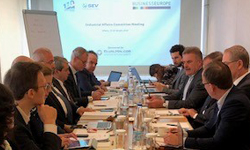 On 29-30 January 2018, SEV Hellenic Federation of Enterprises hosted the BusinessEurope Industrial Affairs Committee in Athens. The Committee discussed the importance and key features of an industry policy strategy both at EU level and in Greece. Exchanging views with the Deputy Director General of European Commission Directorate General for Internal Market, Industry, Entrepreneurship and SMEs (DG GROW), Antti Peltomaki, Gerhard Koch, chair of the Committee, stressed that "2018 will be decisive in giving life to the European Commission's strategy published last Autumn. In particular, quick progress is crucial in developing new objectives and indicators for the post-2020 period." SEV hosted a dinner with Alexis Charitsis, the alternate Minister of Greece for Economy and Development as the keynote speaker. Theodore Fessas, Chairman of SEV, stated “Manufacturing in Greece showed excellent resilience during the crisis. It is now imperative to set a national target to increase its contribution to GDP to 12% by 2020. The implementation of a bold industrial strategy is necessary in order to meet EU benchmarks, create new jobs, encourage investments and improve exports. In addition, barriers like over-taxation, cost of energy and cost of finance have to be dealt with urgently”.
On 29-30 January 2018, SEV Hellenic Federation of Enterprises hosted the BusinessEurope Industrial Affairs Committee in Athens. The Committee discussed the importance and key features of an industry policy strategy both at EU level and in Greece. Exchanging views with the Deputy Director General of European Commission Directorate General for Internal Market, Industry, Entrepreneurship and SMEs (DG GROW), Antti Peltomaki, Gerhard Koch, chair of the Committee, stressed that "2018 will be decisive in giving life to the European Commission's strategy published last Autumn. In particular, quick progress is crucial in developing new objectives and indicators for the post-2020 period." SEV hosted a dinner with Alexis Charitsis, the alternate Minister of Greece for Economy and Development as the keynote speaker. Theodore Fessas, Chairman of SEV, stated “Manufacturing in Greece showed excellent resilience during the crisis. It is now imperative to set a national target to increase its contribution to GDP to 12% by 2020. The implementation of a bold industrial strategy is necessary in order to meet EU benchmarks, create new jobs, encourage investments and improve exports. In addition, barriers like over-taxation, cost of energy and cost of finance have to be dealt with urgently”.
A few days earlier BusinessEurope organised, with the support of the Bulgarian Presidency of the Council of the EU, a workshop on 26 January to discuss a long-term vision for an EU industrial strategy and possible underlying headline indicators. The aim of the workshop, attended by over 80 participants, was to incentivise discussion on these two complex issues which will be fundamental for a successful strategy for European Industry. Speakers from think tanks (EPC, Bruegel), institutes (IW Cologne), the European Commission and industry representatives discussed building blocks that should shape the long-term vision as well as principles for setting-up a meaningful set of indicators.
Contact: Alexandre Affre or Joana Valente
Meeting Swedish Minister of EU Affairs and Trade on Brexit
 During a meeting with the Swedish Minister for EU Affairs and Trade, Ann Linde, on 29 January 2018, BusinessEurope Director for International Relations, Luisa Santos, had the opportunity to discuss how business in Europe is perceiving and preparing for the challenges of Brexit. They also exchanged views on the negotiating directives for the transition adopted by the EU 27, the different scenarios for the future EU-UK relation and the work that BusinessEurope is doing through its dedicated Task Force. Santos stated that time is of essence from a business point of view and it is important that negotiations start on the transition followed by the future relation as early as possible. Minister Linde showed interest in having the business views on the future EU-UK relation and insisted that companies, especially small and medium-sized enterprises (SMEs) should be made well aware of the potential impact of Brexit on their business. BusinessEurope’s publication with company examples of a “cliff-edge” Brexit is a tool to raise awareness and draw companies’ attention to some of the areas that might be impacted by Brexit.
During a meeting with the Swedish Minister for EU Affairs and Trade, Ann Linde, on 29 January 2018, BusinessEurope Director for International Relations, Luisa Santos, had the opportunity to discuss how business in Europe is perceiving and preparing for the challenges of Brexit. They also exchanged views on the negotiating directives for the transition adopted by the EU 27, the different scenarios for the future EU-UK relation and the work that BusinessEurope is doing through its dedicated Task Force. Santos stated that time is of essence from a business point of view and it is important that negotiations start on the transition followed by the future relation as early as possible. Minister Linde showed interest in having the business views on the future EU-UK relation and insisted that companies, especially small and medium-sized enterprises (SMEs) should be made well aware of the potential impact of Brexit on their business. BusinessEurope’s publication with company examples of a “cliff-edge” Brexit is a tool to raise awareness and draw companies’ attention to some of the areas that might be impacted by Brexit.
![]() Contact: Luisa Santos
Contact: Luisa Santos
High-level roundtable on Privacy
 BusinessEurope discussed the soon to be fully enforced General Data Protection Regulation (GDPR) and ongoing Privacy Shield with the European Commission during an industry roundtable on privacy policy on 30 January in Brussels. European Commission Vice-President, Andrus Ansip, European Commissioner for Justice, Consumers and Gender Equality, Věra Jourova, and European Commissioner for Digital Economy and Society, Mariya Gabriel, attended the event. Marc Vancoppenolle, Vice Chair of BusinessEurope’s Digital Economy Taskforce, raised that while businesses are preparing to become fully GDPR compliant, it is difficult as guideline discussions are ongoing at the European and national level. While it is beneficial that the Commission released a communication just last week in an attempt to raise awareness and set out next steps, businesses will remain an important stakeholder to elevate on the ground concerns. BusinessEurope looks forward to continued cooperation with the Commission in this regard.
BusinessEurope discussed the soon to be fully enforced General Data Protection Regulation (GDPR) and ongoing Privacy Shield with the European Commission during an industry roundtable on privacy policy on 30 January in Brussels. European Commission Vice-President, Andrus Ansip, European Commissioner for Justice, Consumers and Gender Equality, Věra Jourova, and European Commissioner for Digital Economy and Society, Mariya Gabriel, attended the event. Marc Vancoppenolle, Vice Chair of BusinessEurope’s Digital Economy Taskforce, raised that while businesses are preparing to become fully GDPR compliant, it is difficult as guideline discussions are ongoing at the European and national level. While it is beneficial that the Commission released a communication just last week in an attempt to raise awareness and set out next steps, businesses will remain an important stakeholder to elevate on the ground concerns. BusinessEurope looks forward to continued cooperation with the Commission in this regard.
Contact: Patrick Grant
General Data Protection Regulation: the times are changing
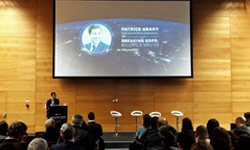 BusinessEurope Digital Economy Adviser Patrick Grant delivered a key note speech at the conference “Breaking GDPR: Become a Master”, held by the Confederação Empresarial de Portugal (CIP) and Microsoft in Lisbon on 30 January. He explained that businesses want to see the original intention of creating a single set of data protection rules in Europe fulfilled, however, there is still a lot of effort needed to ensure that this goal can become a reality. “Businesses want to be GDPR complaint to reinforce trust while ensuring innovative services through the free flow of personal data. Member States should also match the Commissions’ ambition of financing awareness raising campaigns”, he said, concluding that the GDPR has the possibility to be the gold standard of global privacy law if it can be demonstrated that its objectives can be achieved in practice.
BusinessEurope Digital Economy Adviser Patrick Grant delivered a key note speech at the conference “Breaking GDPR: Become a Master”, held by the Confederação Empresarial de Portugal (CIP) and Microsoft in Lisbon on 30 January. He explained that businesses want to see the original intention of creating a single set of data protection rules in Europe fulfilled, however, there is still a lot of effort needed to ensure that this goal can become a reality. “Businesses want to be GDPR complaint to reinforce trust while ensuring innovative services through the free flow of personal data. Member States should also match the Commissions’ ambition of financing awareness raising campaigns”, he said, concluding that the GDPR has the possibility to be the gold standard of global privacy law if it can be demonstrated that its objectives can be achieved in practice.
Contact: Patrick Grant
Economic integration - fundamental for the accession of Western Balkans to the EU
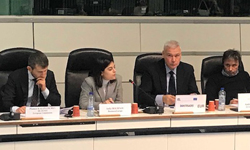 The European Economic and Social Committee (EESC) organised a Public Hearing on the economic and social cohesion and European integration of the Western Balkans in Brussels on 30 January. Representing BusinessEurope, Sofia Bournou welcomed the prioritisation of Western Balkans’ integration in the context of the EU’s Enlargement Policy, supported by the efforts of the current Bulgarian Presidency of the EU. She highlighted that from a European business perspective, pursuing ambitious reforms to modernise the economies in the region is necessary in order to be able to attract long-term, sustainable investments. “Investors are not only looking into macro-economic factors, but also political conditions that ensure a stable and predictable environment, based on rule of law and a functioning market economy”, Bournou stated. An open trade policy, she added, can also contribute to the process of integration in Western Balkans. The EU is already supporting this trough concrete measures, such as trade preferences, in the context of the “Stabilisation and Association Agreements” signed with the countries in the region. Supporting a strong an independent civil society in the Western Balkans is an aspect of integration that cannot be neglected either. Significant progress has been achieved in the past years – with projects such as the Business Organisations as Single Market Integration Players, led by BusinessEurope for many years, contributing – but more needs to be done. “The EU should be ready to provide further support through awareness and capacity building”, Bournou concluded.
The European Economic and Social Committee (EESC) organised a Public Hearing on the economic and social cohesion and European integration of the Western Balkans in Brussels on 30 January. Representing BusinessEurope, Sofia Bournou welcomed the prioritisation of Western Balkans’ integration in the context of the EU’s Enlargement Policy, supported by the efforts of the current Bulgarian Presidency of the EU. She highlighted that from a European business perspective, pursuing ambitious reforms to modernise the economies in the region is necessary in order to be able to attract long-term, sustainable investments. “Investors are not only looking into macro-economic factors, but also political conditions that ensure a stable and predictable environment, based on rule of law and a functioning market economy”, Bournou stated. An open trade policy, she added, can also contribute to the process of integration in Western Balkans. The EU is already supporting this trough concrete measures, such as trade preferences, in the context of the “Stabilisation and Association Agreements” signed with the countries in the region. Supporting a strong an independent civil society in the Western Balkans is an aspect of integration that cannot be neglected either. Significant progress has been achieved in the past years – with projects such as the Business Organisations as Single Market Integration Players, led by BusinessEurope for many years, contributing – but more needs to be done. “The EU should be ready to provide further support through awareness and capacity building”, Bournou concluded.
Contact: Sofia Bournou
China must embrace a more open and cooperative strategy for the Belt and Road Initiative
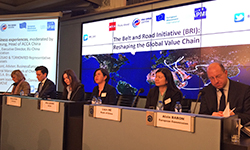 European business sees opportunities in the implementation of the Belt and Road Initiative (BRI). The Asian Development Bank estimates that the annual infrastructure needs in the region amount to $1.7 trillion per year over the next 15 years. European companies are well placed and globally recognised for their expertise in providing environmentally friendly and resource-efficient materials and products for large-scale projects. While the BRI is of interest to a number of sectors, few European companies have been able to participate in the BRI to date. “A top-down implementation by the Chinese government, enormous subsidies, non-transparent procurement practices, public financing models that do not follow OECD guidelines, and an overall lack of information prevent many European companies from competing, let alone participating in BRI projects”, Maurice Fermont, BusinessEurope Adviser on China, said at a Belt and Road conference hosted by the Association of Chartered Certified Accountants (ACCA), UEAPME - the European Association of Craft, Small and Medium-sized Enterprises, the EU-Asia Center and the European Movement International on 30 January. “China needs to engage in greater dialogue about the implementation of the BRI and disseminate more information, while Europe should engage with this project at a European level to figure out how to link up the Eurasian continent and defend key principles such as market-based procurement practices and a rules-based approach”, he continued.
European business sees opportunities in the implementation of the Belt and Road Initiative (BRI). The Asian Development Bank estimates that the annual infrastructure needs in the region amount to $1.7 trillion per year over the next 15 years. European companies are well placed and globally recognised for their expertise in providing environmentally friendly and resource-efficient materials and products for large-scale projects. While the BRI is of interest to a number of sectors, few European companies have been able to participate in the BRI to date. “A top-down implementation by the Chinese government, enormous subsidies, non-transparent procurement practices, public financing models that do not follow OECD guidelines, and an overall lack of information prevent many European companies from competing, let alone participating in BRI projects”, Maurice Fermont, BusinessEurope Adviser on China, said at a Belt and Road conference hosted by the Association of Chartered Certified Accountants (ACCA), UEAPME - the European Association of Craft, Small and Medium-sized Enterprises, the EU-Asia Center and the European Movement International on 30 January. “China needs to engage in greater dialogue about the implementation of the BRI and disseminate more information, while Europe should engage with this project at a European level to figure out how to link up the Eurasian continent and defend key principles such as market-based procurement practices and a rules-based approach”, he continued.
Contact: Maurice Fermont
EFSI: a tool for growth? Discussing at Italian Economic and Social Committee
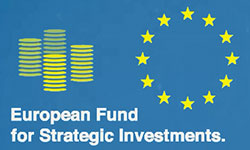 ‘EFSI is a welcome tool to help mobilise investment, promote a greater risk culture in project finance and raise public attention to the problem of weak investment’, was a key message of BusinessEurope’s Economics Director, James Watson, at event on the European Fund for Strategic Investment (EFSI) in Rome on 23 January. The event, organised by the Italian Economic and Social Committee (CNEL), focused on the question ‘EFSI: a tool for growth?’, and also featured MEP José Manuel Fernandes and European Investment Bank (EIB) Vice-President, Dario Scannapieco. On the specific question of the impact of the EFSI on overall EU growth, James noted, that whilst it is clear that EFSI is having a positive impact on EU investment and growth, for a very limited outlay from the EU budget, more evaluation evidence is required before we can confidently put a detailed figure on this effect.
‘EFSI is a welcome tool to help mobilise investment, promote a greater risk culture in project finance and raise public attention to the problem of weak investment’, was a key message of BusinessEurope’s Economics Director, James Watson, at event on the European Fund for Strategic Investment (EFSI) in Rome on 23 January. The event, organised by the Italian Economic and Social Committee (CNEL), focused on the question ‘EFSI: a tool for growth?’, and also featured MEP José Manuel Fernandes and European Investment Bank (EIB) Vice-President, Dario Scannapieco. On the specific question of the impact of the EFSI on overall EU growth, James noted, that whilst it is clear that EFSI is having a positive impact on EU investment and growth, for a very limited outlay from the EU budget, more evaluation evidence is required before we can confidently put a detailed figure on this effect.
![]() Contact: James Watson
Contact: James Watson
Educate for the future and tap into the potential of new technology
 Training relevant skills through education is an important condition of future growth, value creation, innovation, and productivity. To progress in the right direction, education institutions should focus more on future on the competences acquired by students through education. This was one of the key messages given by Maxime Cerutti, BusinessEurope Director of Social Affairs, at the European Education Summit on 25 January. Among other topics, the summit explored the role of digital learning methods. Improving the digital learning infrastructure, in complementarity with inter-personal learning in classrooms, can have a positive effect on access, cost effectiveness and quality of education, Cerutti added.
Training relevant skills through education is an important condition of future growth, value creation, innovation, and productivity. To progress in the right direction, education institutions should focus more on future on the competences acquired by students through education. This was one of the key messages given by Maxime Cerutti, BusinessEurope Director of Social Affairs, at the European Education Summit on 25 January. Among other topics, the summit explored the role of digital learning methods. Improving the digital learning infrastructure, in complementarity with inter-personal learning in classrooms, can have a positive effect on access, cost effectiveness and quality of education, Cerutti added.
Contact: Robert Plummer
EU regulations must be fit for innovation and support companies’ growth
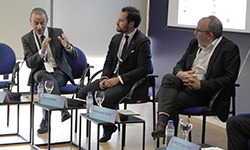 Policy-makers must opt for a more innovation-conducive regulatory framework, on both EU and national levels. Implementing the ‘Innovation principle’ and completing the EU’s internal market, Europe can prevent the innovation leakage and let companies fully exploit their grow potential. This was stressed by BusinessEurope Senior Adviser Jan Bambas at a conference organised jointly by Portuguese National Innovation Agency (ANI) with the European network of innovation and technology agencies on 25 January in Lisbon. The conference looked at the concrete means to support start-ups and companies to invest in innovation. Bambas reiterated the collaborative approach in EU-funded programmes and strengthening of the entrepreneurial ecosystems to benefit the society and companies of all sizes. Both disruptive and incremental innovation will contribute to the future societal challenges and economic growth. Therefore, they need to have an equally prominent place in the upcoming 9th EU Framework Programme for Research & Innovation, as well as in other funding instruments.
Policy-makers must opt for a more innovation-conducive regulatory framework, on both EU and national levels. Implementing the ‘Innovation principle’ and completing the EU’s internal market, Europe can prevent the innovation leakage and let companies fully exploit their grow potential. This was stressed by BusinessEurope Senior Adviser Jan Bambas at a conference organised jointly by Portuguese National Innovation Agency (ANI) with the European network of innovation and technology agencies on 25 January in Lisbon. The conference looked at the concrete means to support start-ups and companies to invest in innovation. Bambas reiterated the collaborative approach in EU-funded programmes and strengthening of the entrepreneurial ecosystems to benefit the society and companies of all sizes. Both disruptive and incremental innovation will contribute to the future societal challenges and economic growth. Therefore, they need to have an equally prominent place in the upcoming 9th EU Framework Programme for Research & Innovation, as well as in other funding instruments.
Contact: Jan Bambas
Moving towards a less fragmented transport sector
 With the recent launch of the mobility package, Europe has taken an important step to tackle fragmentation in road transport sector and to adapt it to new technologies as well as new business models. The time is ripe to act and foster free movement and fair conditions for all working in the transport sector. This also includes reaching a better level-playing field for drivers, operators and businesses in general which currently struggle with complex rules around logistics. A strong enforcement across all Member States will be essential to ensure the system’s well-functioning. These messages were voiced by Michael Svane, Chair of BusinessEurope Transport Working Group at an European Parliament roundtable on “Moving towards a fairer transport sector” organised by MEPs Mark Demesmaeker and Helga Stevens.
With the recent launch of the mobility package, Europe has taken an important step to tackle fragmentation in road transport sector and to adapt it to new technologies as well as new business models. The time is ripe to act and foster free movement and fair conditions for all working in the transport sector. This also includes reaching a better level-playing field for drivers, operators and businesses in general which currently struggle with complex rules around logistics. A strong enforcement across all Member States will be essential to ensure the system’s well-functioning. These messages were voiced by Michael Svane, Chair of BusinessEurope Transport Working Group at an European Parliament roundtable on “Moving towards a fairer transport sector” organised by MEPs Mark Demesmaeker and Helga Stevens.
![]() Contact: Pedro Oliveira
Contact: Pedro Oliveira
Taking stock of the 4th industrial revolution
 The conference “Digitalisation and Big Data: unlocking the potential for economic growth” on 31 January in Brussels was an opportunity for BusinessEurope to discuss the broad initiative of digitising industry as launched by the European Commission in 2015. Digital Economy Adviser Patrick Grant took part in a panel debate and could also discuss how ongoing initiatives in cybersecurity, the free flow of data, ePrivacy, Artificial Intelligence and Robotics fit within it. Noted that Europe needs to speed up this process and ensure that all sectors, regions and sizes of businesses digitalise while taking cybersecurity threats seriously. Both in the context of state funded industrial espionage and connected consumer products. Investment in our digital infrastructure and financing of technologies, he added, need to be allocated in the right place at the right time, coordination across regions through Digital Innovation Hubs (DIH) will aid in this regard. “Real-time discussion between stakeholders is the most efficient way policy makers can keep up with the pace of the 4th industrial revolution”, Grant concluded.
The conference “Digitalisation and Big Data: unlocking the potential for economic growth” on 31 January in Brussels was an opportunity for BusinessEurope to discuss the broad initiative of digitising industry as launched by the European Commission in 2015. Digital Economy Adviser Patrick Grant took part in a panel debate and could also discuss how ongoing initiatives in cybersecurity, the free flow of data, ePrivacy, Artificial Intelligence and Robotics fit within it. Noted that Europe needs to speed up this process and ensure that all sectors, regions and sizes of businesses digitalise while taking cybersecurity threats seriously. Both in the context of state funded industrial espionage and connected consumer products. Investment in our digital infrastructure and financing of technologies, he added, need to be allocated in the right place at the right time, coordination across regions through Digital Innovation Hubs (DIH) will aid in this regard. “Real-time discussion between stakeholders is the most efficient way policy makers can keep up with the pace of the 4th industrial revolution”, Grant concluded.
Contact: Patrick Grant
Calendar 
- 12-13 February: Global Business Coalition Plenary Meeting, Washington DC
- 20-21 February: Circular Economy Stakeholder Conference
- 21 February: Company law package
- 22-23 February: Second European Industry Day
- 23 February: Informal meeting of Heads of State or Government
- 28 February: European Semester Winter Package